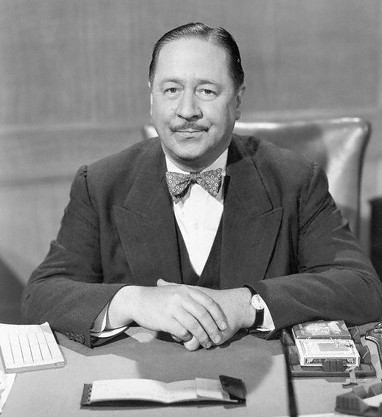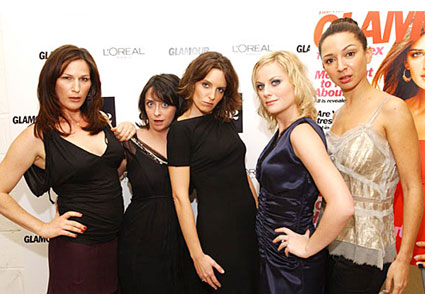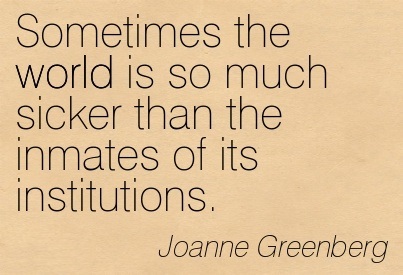Allison Page, collaborating.
I used to be a loner. Picture a grouchy old bearded man in a sweater, hunkered down in an armchair, scribbling away on a stack of paper, occasionally shaking his fist at the sky. Possibly at some point he throws half a glass of bourbon in the face of his wife. That was me, but not a man with a beard. You know, but bearded on the INSIDE. Often, I think people have this idea of what a writer is and immediately they think of Ernest Hemingway. And that’s how you’re supposed to be a good writer, isn’t it? All the geniuses and masters toil away in their own well-crafted solitary confinement – crouched down in their pillow forts where all the pillows are barbed wire, and we tell ourselves that’s how you get to be a writer. That’s how you get to be an artist. AN ARTISTE. That suffering makes your art better is a long held idea. I admit to buying into that at some point. I think we all have – especially when young and impressionable. Anyone who caught the bug of wanting to write books or plays or poems (DEFINITELY POEMS) or to act or dance or paint or sculpt or…I don’t know, whatever you guys are doing – puppetry? Anyone who had that impulse at a young age probably started identifying their artistic heroes and began to define what they wanted to be by taking note of what created the artists they connected to most. That was a hell of a sentence.
Let’s take young, pink-haired, angry Allison for example.
I’ve known I wanted to be an actor since I was probably 5 years old. At that age I was mostly inspired by cartoon characters – let’s be real, cartoons are fucking great. Actually, I remained inspired by cartoons for a while. Actually actually, I still am. I was the only little girl I knew who wanted to be The Genie from Aladdin instead of Jasmine. Animaniacs was a big deal in my life. I mean, it still is. It holds up. (Garfield and Friends does not. Don’t bother.) Once we start getting into the real people I looked up to, though, it doesn’t take long to start finding the darkness. (If we’re being honest The Genie isn’t actually that happy a character, he just deflects his sorrow with jokes. So I guess the darkness crept in even earlier than I thought.)
By the time I was 14, I was already very into old movies. Yes, I was very cool and popular (lies). It was at that age that I first watched a little movie called Der Blaue Engel, or The Blue Angel. It’s a little German tragicomedy about a teacher who falls in love with a cabaret performer. IT DOESN’T GO WELL. It ends with Emil Jannings dying while regretfully clutching the desk from which he used to teach before the succubus Marlene Dietrich ruined his life because he loved her so much that it turned him into a literal sad clown. SO FUN. And that’s the actual movie that made me want to be an actor. Isn’t that wild? Sorry, spoilers in case you haven’t had time to catch this movie since it came out in 1930. But really, it’s beautiful and cruel, you should see it. That was sort of a sidebar because I’m really talking about writers, but I was an actor first so there ya go. When I was 16 I decided I finally had a favorite play. It’s still my favorite play. What is it?
Who’s Afraid of Virginia Woolf?
Yikes.
Quite a choice for a teenage mind. But just because something is dark, does that necessarily mean it came from a person who is feeling dark? When you look at comedies, they certainly don’t necessarily come from people who are feeling fun and light. I’m meandering a little on the topic at hand. Let’s get back to it.
Here’s a sampling of some writerly heroes of mine:
F. Scott Fitzgerald
Dawn Powell
Dorothy Parker
Raymond Chandler
Dashiell Hammett
Clare Booth Luce
Robert Benchley
Go ahead and google how many of them were lonely writers and avid drinkers. Just as a sample group. Get ready to be sad!

Robert Benchley: absolutely hilarious and definitely died slowly of cirrhosis of the liver because he loved sad/alone drinking. YAYYYY.
I’m not saying I’m as gloomy as any of those people or that they were alcoholics because they were writers, but I think writing can breed loneliness or at least nudge it along. You so often do it alone. I mean, in the end you have to do it alone, right? You can’t have 20 fingers typing on your keyboard or writing with your pencil. Well, you could, but it would take forever. As much as I am alone when I write, I try to spend an equal amount of time either writing WITH other people – like, actually collaborating on something, or writing NEAR other people. I think if you’re in the business of writing about people, that it’s good to maintain connections to people as opposed to doing the opposite of that.
When I write sketch comedy, I do that in a super fun writers room scenario. There are something like 10 – 15 of us (some writers, some actors) throwing out ideas, talking about possibilities, and laughing really hard. It is AMAZING. It feels like magic should feel. So much so, that when I’m executing all those ideas, it still feels collaborative even when I’m alone. Weird, right?
Clearly that’s kind of specific to sketch. When you’re writing a novel, or a play, or whatever else you’re writing, you’re not always looking for that level of collaboration. But that doesn’t mean you have to stew alone all the time. I like to be alone together. I can sit and work on what I’m working on, and a friend can sit across from me or next to me at the table to my left, and we work in silence sipping coffee as long as we can, then turn to each other when we kind of can’t bear it for a minute. We’ll gossip about something, or talk about the trouble we’re having with a particular section, or even *gasp* read a bit we’re particularly proud of to the other person. Or if we’re really struggling, just talk about the coffee we’re drinking. Sometimes if I’m working on something particularly draining, chatter about coffee might be the most I’m able to think about. It’s been good for me, this process.
I want to be a good writer. I think I’m an okay one. I want to be good, but not at the expense of my grip on reality and connections to other people. I don’t need to be Fitzgerald or Parker or Powell, I just want to be the best writer I can be while not falling into the gloom. If that means I don’t go down in history, I’m okay with that. Since allowing myself the possibility of collaborating or writing alone together, everything seems like a little bit less of a struggle. I mean, geez, writing is already not so easy. If you can find a way to make it a little bit easier, I don’t see how that can be bad. I still have my grouchy-old-man-in-a-cardigan moments, but I have fewer of them. And there’s a nice space of happiness in between: the comfort of knowing that the person next to you is dealing with the same thing you are. Or, if you’re competitive, the knowledge that you may be kicking their ass in the number-of-pages-typed-in-a-day department.
I’m not going to say collaboration will kick your depression. What am I, a doctor? No. I’m not a doctor. Don’t ever let me tell you otherwise. But what I am saying is that while hell may be other people, it is also probably a lack of other people. We need each other a little bit. Maybe even just for an occasional reality check.
There isn’t one way to be a successful/good/happy writer. Just like there isn’t one way to be nearly anything. Don’t try to fit yourself into a dangerous mould. Make your own mould. Hell, BE the mould.
Me? I get by with a little help from my friends.
Allison Page is a writer/actor/comedian. Her new play HILARITY, about a comedian struggling with alcoholism and jokes, is being produced by DIVAfest and has its world premiere at The EXIT Theatre in San Francisco. Previews start March 5th. Tickets at hilarity.bpt.me



